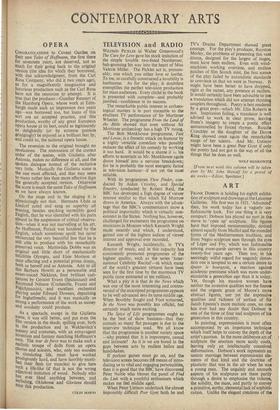TELEVISION and RADIO
WILFRED PICKLES in Walter Greenwood's The Cure for Love gave his stock imitation of the simple lovable two-fisted Northerner, bah-gooming his way into the heart of Miss Valerie Miller. The Pickles act is, presum- ably, one which you either love or loathe. To me, so carefully constructed a lovability is loathsome. As for the play, it doubtless exemplifies the perfect television production for mass audiences. Every cliche in the book is presented with complete—and probably justified—confidence in its success.
The remarkable public interest in archteo- logical matters is in part traceable to the ebullient TV performance of Sir Mortimer
Wheeler. The programme From the Land of the Bible showed that even without Sir
Mortimer archteology has a high TV rating.
The Bob Monkhouse programme, Fast and Loose, is a frenetic attack on humour by
a highly versatile comedian who possibly reduces the effect of his comedy by working it too hard. It would be a shame if ilL his efforts to entertain us Mr. Monkhouse again drove himself into a nervous breakdown; for he is probably the most energetic factor in television humour—if not yet the most reliable.
With its programmes View Finder, con- ducted by Aidan Crawley, and Special Enquiry, conducted by Robert Reid, the
BBC has developed a high degree of viewer interest similar to that which Ed Murrow draws in America. Always with the advan- tage that the BBC's commentators show a political impartiality which is virtually non- existent in the States. Nothing has, however, challenged for excitement the programme on musicians in Moscow which Kenneth Wright made recently and which, I understand, gained one of the highest indices of viewer interest and approval ever recorded.
Kenneth Wright, incidentally, is TV's director of music, and in this capacity has consistently promoted programmes of the highest quality, such as the series 'Inter- national Celebrity Recital'—in which many of the world's greatest virtuosi have been seen for the first time by the enormous TV public (now estimated at ten million).
What a pity it is that In the News which was one of the most interesting and contro- versial of the unscripted programmes appears to be well advanced into its tame middle age. When Boothby fought and Foot screamed, In the News was possibly less official, but certainly much more exciting.
The Spice of Life programmes ought to be the best of show business—that they
contain so many flat passages is due to the interview technique used. We all know that the programme is another variety space —why pretend that it is impromptu, casual and intimate? As it is we are bored in the gaps between acts by endless hellos and handshakes.
If parlour games must go on, and the television screen becomes tht means of intro-
ducing us to vital and engaging personalities, then it is good that the BBC have discovered Peter Noble who blesses the panel of Find the Link with a youthful enthusiasm which makes me feel middle aged.
When Peter Ustinov undertook the almost impossibly difficult Peer Gynt both he and TV's Drama Department showed great courage. For the play's producer, Royston Morley, the problems of presenting this vast drama, designed for the largest of stages, must have been endless. Even with wind- machines working overtime, and endless patches of film Scotch mist, the first scenes of the play failed by naturalistic standards to convince us that we were in Norway. It might have been better to have dropped, right at the outset, any pretence at realism. It would certainly have been advisable to use a translation which did not attempt rhyming couplets throughout. Poetry is best rendered by a great poet—which Mr. Ellis Roberts is not. Inspiration failing, a translator is well advised to work in clear prose, leaving Ibsen's imagery to create a poetic effect untrammelled by forced rhymes. Rosalie Crutchley as the daughter of the Dovre King showed once again the remarkable range of her talents. And Mr. Ustinov might have been a great Peer Gynt if only the poetry had not got in the way of all the things that he does so well.
WOLF MANKOWITZ
[From next week this column will be taken over by Mr. John Metcalf for a period of six weeks.—Editor, Spectator.]


































































 Previous page
Previous page